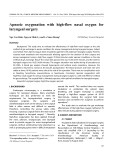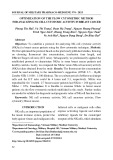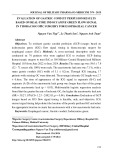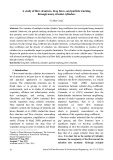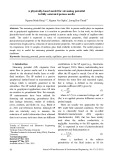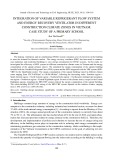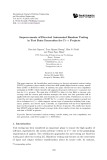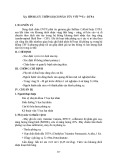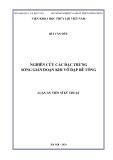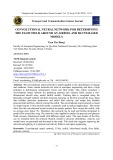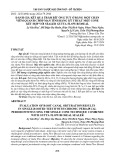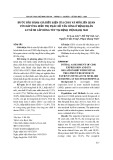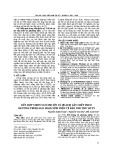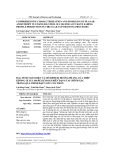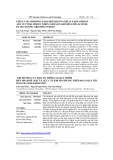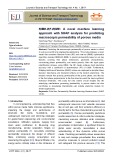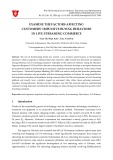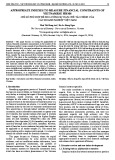Faculty of Coastal Engineering Faculty of Coastal Engineering
BED, BANK & SHORE BED, BANK & SHORE PROTECTION PROTECTION
Lecturer: Pham Thu Huong Lecturer: Pham Thu Huong
Chapter 6 Chapter 6 Loads Waves -- Loads Waves
(6 class hours)
Content Content
6.1 Introduction
6.2 Non breaking waves
6.3 Breaking waves
6.4 Wave on the slope
6.4 Reduction of wave loads
6.5 Summary
Wave issues Wave issues
Generation: H, Tcharacteristic = f (uwind, h, fetch) Hydrodynamics: u, p, τ= f (H,T,h)
Statistics:p(H) = f (Hcharacteristic, distribution function)
1. Wave generation
3. Wave statistics
2. Wave hydrodynamics
Examples of wave loads Examples of wave loads
In which: In which: standing wave (A) -- standing wave (A) breaking wave on a mild slope (B)(B) -- breaking wave on a mild slope breaking wave on a steeper slope (C)(C) -- breaking wave on a steeper slope
Wave motion in periodic, Wave motion in periodic, unbroken wave unbroken wave
Validity of wave theories Validity of wave theories
Application of linear theory Application of linear theory
gradient in filter under breakwater gradient in filter under breakwater
Friction under waves Friction under waves
friction factor and ccff friction factor and
ˆ τ w
2 ˆ c u f b
1 ρ= 2
ab: wave amplitude at bottom
with:
=
ˆ u b
a ω= b
a ω kh sinh
ω : angular frequency in waves (=2π/T)
u
=
tω
ˆ sinb u
−
/
k
−
6.0 5.2 +
(
) 0.19
a b
r
⎡ ⎢ ⎣
⎤ ⎥ ⎦
c
e
with:
c
0.3
=
=
f
f
max
shore effects NearNear--shore effects
Shoaling (cid:190)(cid:190) Shoaling
shore effects NearNear--shore effects
Shoaling (cid:190)(cid:190) Shoaling Refraction (cid:190)(cid:190) Refraction
shore effects NearNear--shore effects
Shoaling (cid:190)(cid:190) Shoaling Refraction (cid:190)(cid:190) Refraction Diffraction (cid:190)(cid:190) Diffraction
shore effects NearNear--shore effects
Shoaling (cid:190)(cid:190) Shoaling Refraction (cid:190)(cid:190) Refraction Diffraction (cid:190)(cid:190) Diffraction Reflection (cid:190)(cid:190) Reflection
shore effects NearNear--shore effects
Shoaling (cid:190)(cid:190) Shoaling Refraction (cid:190)(cid:190) Refraction Diffraction (cid:190)(cid:190) Diffraction Reflection (cid:190)(cid:190) Reflection Breaking (cid:190)(cid:190) Breaking
0.142
tanh
L
h
=
bH
breaking waves breaking waves 2 π⎛ ⎜ L ⎝
⎞ ⎟ ⎠
0.78 (
solitary wave
)
≈
bH h
≈
0.4 0.5 −
sH h
the Iribarren the
number Iribarren number
(surf similarity parameter) (surf similarity parameter)
ξ=
tan α H L 0
wave height wave length at deep water
tan α slope of the shoreline/structure H L0
breaker types breaker types
breaker types breaker types
spilling ξ < 0.5
(sóng vỗ bờ)
plunging 0.5 < ξ < 3
(Sóng cuộn đổ)
collapsing ξ = 3
(sóng đổ)
surging ξ > 3
(sóng cồn, sóng dâng)
bore and hydraulic jump bore and hydraulic jump
reflection reflection
Battjes, 1974
small ξ (cid:198) less reflection
R
K
0.1
=
≈
2 ξ
r
Kr = 1 (cid:198) seawall (standing wave)
H H
I
Loads due to breaking Loads due to breaking
depth Breaker--depth Breaker
γb = H/h = 0.78 (solitary wave limit) γb = 0.88 (Miche formula)
change of distribution in change of distribution in shallow water shallow water
run up run up
up calculation RunRun--up calculation
Hunt’s Formula (for regular waves)
ξ=
uR H
CUR/TAW, 1992 (for Irregular waves)
1.5
H
(
3
H
)
=
=
R u
2%
B f
r
s
p
R u
2% max
s
βγγ γ γ ξ
correction factors: roughness • γr approach angle • γβ berm reduction • γB foreshore reduction • γf
up irregular wave Wave run--up irregular wave Wave run
Hs = significant wave height ξ0 = breaker parameter based on Tm-1,0
For smooth slope
friction values friction values
Type of revetment Type of revetment
γγrr 1.01.0
0.950.95
Asphalt, concrete, smooth blocks, grass, Asphalt, concrete, smooth blocks, grass, asphalt SandSand--asphalt Blocks in asphalt or concrete matrix, Blocks in asphalt or concrete matrix, blocks with grass blocks with grass Placed block revetment Placed block revetment
riprap penetrated with asphalt riprap penetrated with asphalt
Single layer of riprap Single layer of riprap
Double layer of riprap Double layer of riprap
0.900.90 0.800.80 0.700.70 0.550.55
Angle of attack Angle of attack
(cid:190)(cid:190) For long crested waves
(swell) For long crested waves (swell)
(wind wave) For short crested waves (wind wave)
0.0022 ((ββin degrees) in degrees)
γγββ = = √√coscos ββ (with minimum of 0.7) (with minimum of 0.7) (cid:190)(cid:190) For short crested waves γγββ = 1 = 1 -- 0.0022 ((with a minimum of 0.8) with a minimum of 0.8)
berm effect berm effect
BB
SWL
Hs
hB
Hs
LB
2
1 = −
1 0.5 −
γ B
h B H
B B L B
s
⎡ ⎢ ⎣
⎤ ⎥ ⎦
⎛ ⎜ ⎜ ⎝
⎞ ⎟ ⎟ ⎠
limits: 0.6 < γB < 1 and -1 < dh /Hs < 1
Shallow foreshore Shallow foreshore
γf = H2% / 1.4Hs
down runrun--down
Battjes formula, 1994:
0.33
= −
=
=
2%
R d
(
1.5
H ξ s p H )
= −
R u H
=
R d R d
2% max
s
( 1 0.4 − ( 1 0.4 −
) ξ ) ξ ξ
Example Example
(cid:190)(cid:190)
A dike with concrete block revetment, slopes 1:3 and a A dike with concrete block revetment, slopes 1:3 and a 2 m bermberm at design level is attacked by perpendicular at design level is attacked by perpendicular 2 m (swell) waves with HHss = 1 m and a steepness of 0.01. = 1 m and a steepness of 0.01. (swell) waves with What is the wave run--up?up? What is the wave run
HS = 1
Wave Slope = 0.01
1:3
Ru ?
2m
1:3
solution solution
Starting point is equation for run--up irregular wave R Starting point is equation for run
up irregular wave Ru2%u2%. .
1.5
H
(
3
H
)
=
=
R u
2%
B f
r
s
p
R u
2% max
s
βγγ γ γ ξ
γγrr = 0.9= 0.9
2
hhBB = 0= 0
= 0.75 hence, γγBB = 0.75 hence,
1 = −
1 0.5 −
γ B
h B H
B B L B
s
⎡ ⎢ ⎣
⎤ ⎥ ⎦
⎛ ⎜ ⎜ ⎝
⎞ ⎟ ⎟ ⎠
+ 2 = 8 m LLBB = 2= 2HsHscotcotαα+ 2 = 8 m
and γγff = 1= 1
γγββ = 1 = 1 and
The surf similarity parameter is tanαα/0.1 = 3.33 > 2, hence The surf similarity parameter is tan
/0.1 = 3.33 > 2, hence ξξ = 2= 2. .
The wave run--up, finally, is then:
= 1.5*0.9*0.75*1*2 ≅≅ 2m 2m
up, finally, is then: RRu2%u2% = 1.5*0.9*0.75*1*2
(cid:41)(cid:41) The wave run above the design level. above the design level.
overtopping overtopping
Ostia, Italy
Samphire Hoe, United Kingdom
Overtoping in Jaade Siel, Germany 22-12-1954
Measured overtopping (breaking) Measured overtopping (breaking)
Measured overtopping Measured overtopping breaking) (non--breaking) (non
Seaward slope seadike Seaward slope
Haiphong seadike Haiphong
Sea dike near Haiphong Sea dike near Haiphong
After Durian (2005) After Durian (2005)
wave impacts on slope wave impacts on slope
TAW formula, 2000:
8
tan
≈
g Hρ
α
p max 50%
w
s
16
tan
≈
α
p max 0.1%
g Hρ w
s
Load reduction Load reduction
WavesWaves
reflection reflection
absorption absorption
transmission transmission
Coastal line Coastal line
Effectiveness
Costs
Linear wave theory Linear wave theory
definitions and behaviour of definitions and behaviour of hyperbolic functions hyperbolic functions
standing wave standing wave
Shallow Water
Transitional water depth
Deep Water
Relative depth
1
h
h
h
1
1
1
<
<
<
>
20
L
L
L
20
2
2
linear wave theory
Wave Celerity
g T
g T
L
L
kh
c
tanh
c
c
=
=
=
=
=
0
T
T
2 π
2 π
L c g h = = T
basic equations
Wave Length
2
2
L
T
g h
=
0
2
k h
g T
1
1
c
c
g h
=
=
g
g T g T L tanh kh L L = = = 2 π 2 π
Group Velocity
1
c
n c
c
c
c
=
=
+
∗
=
=
g
g
0
2
sinh
2
k h
4
2
π
O QP
L NM
T
1
1
2
2
2
Energy Flux (per m width)
F
2 g a
ρ
=
F
E c
ga
g h
F
E c
ga n c
=
=
ρ
=
=
ρ
g
g
8
π
2
2
kz
)
( k h
z
+
u
a e
= ω
θsin
g
u
a
=
u
a
=
sin θ
kh
cosh sin ω θ
Particle velocity Horizontal
kz
h
w
a e
= ω
θsin
Vertical
z
)
sinh
z
+
w
a
=
+
j cos
w
a
cos
ω
θ
=
h
kh
sinh
kz
)
cosh
( k h
z
+
a
g
cos
ξ
= − a e
θ
a
cos
θ
ξ
= −
cos
ξ
θ
= −
sinh ( k h ω θ 1e
Particle displacement Horizontal
kz
kh
sinh
h
ω
sin
ζ
= a e
θ
Vertical
)
sinh
( k h
z
+
a
sin
ζ
=
θ
sinh
kh
kz
)
( k h
cosh z + p g z g a e = − ρ + ρ θsin
Subsurface pressure
sin p g z g a = − ρ + ρ θ p g z g a = − ρ + ρ θsin cosh kh
2 2 π π H k t k x a = = = − ω = θ ω 2 T L
parameters parameters in linear in linear wave theory wave theory
definition of H and T definition of H and T
wave definitions and wave height wave definitions and wave height distribution distribution
Rayleigh distribution Rayleigh distribution
2
2
P H H
exp
exp
2
>
=
−
=
−
{
}
H H
H H
rms
s
⎛ ⎜ ⎝
⎞ ⎟ ⎠
⎛ ⎜ ⎝
⎞ ⎟ ⎠
⎡ ⎢ ⎢ ⎣
⎤ ⎥ ⎥ ⎦
⎡ ⎢ ⎢ ⎣
⎤ ⎥ ⎥ ⎦
H
H
H
H
H
4
≡
≡
≡
≡
≈
s
visual
1/ 3
13.5%
m
0
m 0
wave height and wave period wave height and wave period
wave registration in the North Sea wave registration in the North Sea
Spectral moments: m0 = surface of energy density spectrum m-1 = first negative moment of spectrum
Tm-1,0 = m-1/m0 = spectral wave period ≈ 0.9
spectrum types spectrum types
two types of spectra two types of spectra
wave spectra across shallow bar wave spectra across shallow bar
wave generation wave generation
Deep water (no limitations of depth and fetch):
0.283
and
1.2
=
=
gH s 2 u
gT s 2 uπ
w
w
Shallow water (limitations of depth and fetch) :
0.42
0.0125
0.75
gF 2 u
w
⎛ ⎜ ⎝
⎞ ⎟ ⎠
0.283 tanh 0.578
tanh
=
0.75
gh 2 u
gH s 2 u
w
w
⎛ ⎜ ⎝
⎞ ⎟ ⎠
⎡ ⎢ ⎢ ⎣
⎤ ⎥ ⎥ ⎦
gh 2 u
w
⎛ ⎜ ⎝
⎞ ⎟ ⎠
⎡ ⎢ tanh 0.578 ⎢ ⎣
⎤ ⎥ ⎥ ⎦
⎤ ⎥ ⎥ ⎥ ⎥ ⎥ ⎥ ⎦
0.25
0.077
0.375
gF 2 u
w
⎛ ⎜ ⎝
⎞ ⎟ ⎠
1.20 tanh 0.833
tanh
=
0.375
gT s u 2 π
gh 2 u
w
w
⎛ ⎜ ⎝
⎞ ⎟ ⎠
⎡ ⎢ ⎢ ⎣
⎤ ⎥ ⎥ ⎦
gh 2 u
w
⎛ ⎜ ⎝
⎞ ⎟ ⎠
⎡ ⎢ tanh 0.833 ⎢ ⎣
⎤ ⎥ ⎥ ⎦
⎡ ⎢ ⎢ ⎢ ⎢ ⎢ ⎢ ⎣ ⎡ ⎢ ⎢ ⎢ ⎢ ⎢ ⎢ ⎣
⎤ ⎥ ⎥ ⎥ ⎥ ⎥ ⎥ ⎦
wave height as function of wind, wave height as function of wind, depth and fetch depth and fetch
wave period as function of wind, wave period as function of wind, depth and fetch depth and fetch



